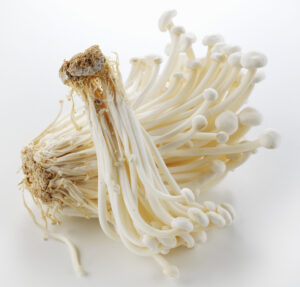When a recent Listeria recall set off some alarm bells at Food Poisoning Bulletin a couple of weeks ago, we asked the U.S. Food and Drug Administration (FDA) how banned enoki mushrooms made their way to store shelves. The answer, it seems, is that the agency is still trying to work that out.

Enoki mushrooms
A Problematic Recall
The FDA doesn’t like to use the term “banned,” they told us. But a ban is the net effect when the FDA issues a countrywide import alert for a food product. This action means that the agency has gathered enough evidence to show that the product is in violation of FDA laws and regulations and can be detained at the border without physical inspection.
In the case of enoki mushrooms from Korea, the evidence includes a 2020 Listeria outbreak in the U.S. that killed four people and caused two pregnant women to suffer miscarriages; product testing results showing 43 percent of enoki mushrooms sampled the year after the outbreak were positive for Listeria, and genetic tests showing the same strain of Listeria was found in multiple shipments over a period of time indicating a “resident pathogen” in Korean mushroom operations. In July 2022, FDA issued a countrywide import alert for enoki mushrooms from Korea.
Companies can be exempted from an import alert and placed on a “green list” if they can supply test results showing their product is pathogen-free. But there is no green list for enoki mushrooms from Korea. That’s why a November 17 Listeria recall by Green Day Produce of Vernon, CA for enoki mushrooms imported from Korea set off alarm bells. They shouldn’t have been on store shelves in the first place.
“The FDA is looking into import shipments that may be related to this recall,” the FDA said in a statement emailed to Food Poisoning Bulletin. “FDA’s standard practice is to conduct a traceback investigation when violative FDA-regulated products have been distributed into the U.S. commerce. Traceback investigations seek to identify the source and any steps that may be needed to prevent the future importation of those violative products.”
The Good News, the Bad News, and the Other Bad News
According to the Green Day Produce recall, the Michigan Department of Agriculture and Rural Development (MDARD) discovered the contamination. That’s the good news. The actions of the hardworking folks at MDARD led to the recall of a product contaminated with a deadly pathogen.
The bad news is MDARD did the testing in the context of an outbreak investigation. An enoki mushroom Listeria outbreak investigation.
One of the outbreak patients lives in Michigan. So, MDARD went to the store where this person purchased the enoki mushrooms he ate before becoming ill, bought some enoki mushrooms, tested them, and found they were positive for Listeria.
Back in 2020, product testing by MDARD helped solve the deadly outbreak. But this time, genetic sequencing showed the Listeria strain cultured from the Green Day Produce enoki mushrooms does not match the strain cultured from the patients. That’s the other bad news. It means that either a previous shipment of banned Green Day Produce enoki mushrooms was contaminated with the outbreak strain, or another brand of enoki mushrooms is tainted with the outbreak strain and may still be on the market.
The Other Bad News Continued
The other thing about the outbreak strain is that it has previously turned up in an enoki mushroom sample FDA collected at import, according to the outbreak update from the Centers for Disease Control and Prevention (CDC). Neither the CDC nor the FDA disclosed the date, brand name, or country of origin for those mushrooms. So, it isn’t known if the test occurred before or after the import alert.
Since 2020, there have been 20 enoki mushroom Listeria recalls. All but one of them, the Green Day Produce recall, occurred prior to the import alert. Ten of them were issued between January 1 and April 30 of this year. By country-of-origin it breaks down like this: Korea (9), China (6), Taiwan (3), and Undisclosed (2). Repeat offenders include YES! (China), Concord Farms (Korea), and Guan’s (Korea).
Today, the FDA has updated its progress on the enoki mushroom Listeria outbreak to reflect that it has moved on from an on-site inspection to sample collection and analysis.
So far, two people are included in this outbreak. Both of them became ill in early October and both were hospitalized. Symptoms of Listeria infections can appear within 24 hours of exposure to contaminated food, but sometimes it can take as long as 70 days for them to develop. Symptoms include severe headache, stiff neck, high fever, other muscle stiffness, loss of balance, and confusion. Among pregnant women, Listeria can cause miscarriage or stillbirth even if the expectant mother experiences only mild symptoms.
At this time the CDC recommends that pregnant women, senior citizens, and people with compromised immune systems refrain from eating enoki mushrooms. The agency cautions other consumers to make sure enoki mushrooms are thoroughly cooked before eating them.





